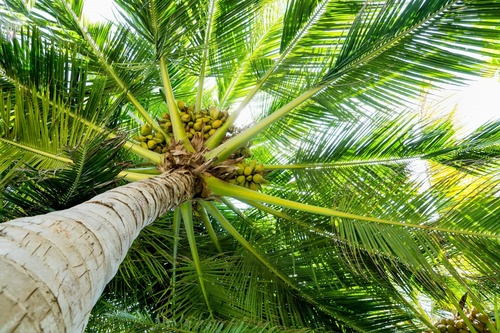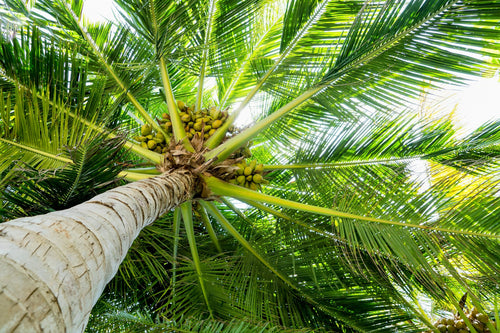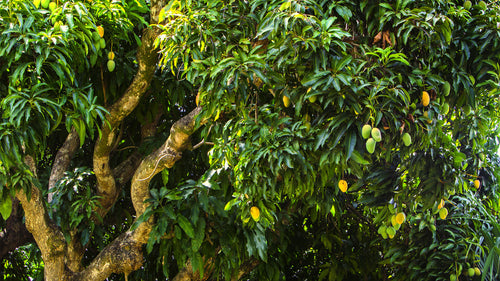Elevating Style, Enriching Soil – Oliver+’s Agroforest Vision
Oliver+ has extended its commitment to sustainability through a tree plantation initiative rooted in the agroforest concept. Embracing its ethos of ti Read more
Project Update 1
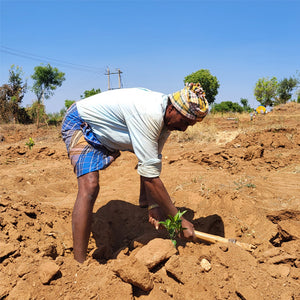
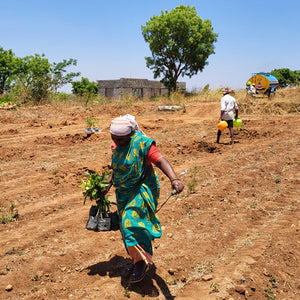
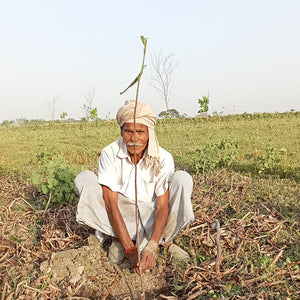
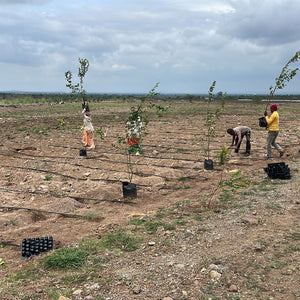
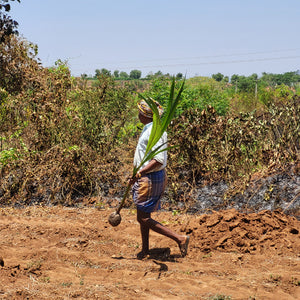

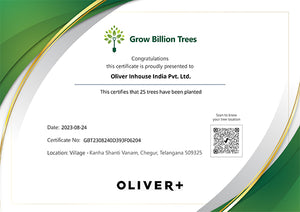
Digital Forest
Forest with 25 Trees planned
Want to plant your tree now?
Plant a Tree @ 299Trees Planted
Elevating Style, Enriching Soil – Oliver+’s Agroforest Vision
Oliver+ has extended its commitment to sustainability through a tree plantation initiative rooted in the agroforest concept. Embracing its ethos of timeless design and modern responsibility, Oliver+ partners with local farmers to cultivate diverse tree species that enhance both the environment and agricultural productivity. This initiative reflects the brand’s dedication to fostering ecological balance while supporting rural communities.
By integrating trees into farmland, Oliver+ not only offsets carbon emissions but also promotes biodiversity and soil health. Each tree planted contributes to creating a greener future, aligning with the brand’s mission to blend sophistication with conscious living. Through this initiative, Oliver+ reinforces the message that fashion can be both stylish and sustainable.
Tree Plantation Date
24th August 2023
Plantation Location
Sahayadri Van, Girvi, Satara, Maharashtra 415523
Trees Planted
Total Count: 25 Trees
Species Name: Mango, Guava, Chiku, Jackfruit, Coconut
Forest Type: Agroforest
Oliver+ has embraced sustainability through a tree plantation initiative rooted in the agroforest concept, blending environmental responsibility with community upliftment. By integrating diverse tree species into agricultural landscapes, Oliver+ enhances biodiversity, improves soil health, and supports local farmers. This initiative not only offsets carbon emissions but also fosters long-term ecological balance, reflecting the brand’s philosophy of harmonizing style with sustainability. With each tree planted, Oliver+ reinforces its commitment to a greener future, proving that fashion can drive meaningful environmental change while empowering rural communities.
Advantages Of Agroforest
Enhanced Income Diversification for Farmers
By integrating trees with crops, farmers benefit from multiple revenue streams. Trees provide fruits, nuts, timber, and other resources, creating alternative income sources alongside traditional farming. This diversification reduces reliance on a single crop, ensuring more stable financial returns throughout the year.Improved Livelihood Resilience
Agroforestry makes farms more resilient to environmental changes and economic fluctuations. The presence of trees protects crops from extreme weather, preventing soil erosion and acting as windbreaks. This natural shield enhances overall farm productivity, safeguarding the livelihood of farmers against climate unpredictability.Reduced Farming Costs
Trees in agroforests enrich the soil with nutrients, reducing the need for chemical fertilizers and pesticides. This lowers operational costs for farmers while promoting healthier, organic produce. Additionally, agroforestry minimizes water usage by improving soil moisture retention, leading to long-term savings.Increased Biodiversity
Agroforestry fosters a balanced ecosystem by attracting pollinators, birds, and beneficial insects. This enhances crop yields naturally and restores ecological harmony, creating a healthier environment for farming and local wildlife.Carbon Sequestration and Environmental Sustainability
Planting trees helps offset carbon emissions by absorbing CO2, contributing to Oliver+’s sustainability goals. Agroforests play a crucial role in mitigating climate change, reinforcing the brand’s commitment to reducing its environmental footprint.Community Empowerment and Upliftment
Oliver+’s tree plantation initiative provides local communities with training and resources to adopt agroforestry, fostering economic growth and environmental stewardship. This empowers farmers with knowledge and tools, creating a ripple effect of sustainable development.Long-Term Soil Health and Productivity
Tree roots prevent soil erosion, enhance water retention, and improve soil structure over time. Healthier soil leads to increased agricultural productivity, ensuring better yields and sustainable farming for future generations.
Activities During Tree Plantation
During Oliver+’s tree plantation initiative, all planting activities are carried out by local farmers as part of the agroforest concept. Farmers carefully plant selected native diverse tree species that complement existing crops, enhancing soil fertility and promoting biodiversity. The process includes site preparation, sapling planting, and natural mulching to retain soil moisture. Farmers also engage in post-plantation care, such as watering, pruning, and monitoring tree growth to ensure healthy development. This hands-on approach not only boosts agricultural productivity but also empowers farmers with skills and additional income, reinforcing Oliver+’s commitment to sustainable and community-driven environmental restoration.
Tree Plantation Purpose
SDGs Achieved Through Oliver+ Agroforest Tree Plantation Initiative
1. SDG 1: No Poverty
Oliver+’s agroforest initiative creates additional income streams for farmers by integrating fruit-bearing and timber trees into their land. This diversification boosts earnings, reduces vulnerability to crop failure, and enhances long-term economic stability for rural communities, contributing to poverty alleviation.2. SDG 2: Zero Hunger
Agroforestry improves food security by increasing land productivity and promoting crop diversity. By planting trees that yield fruits, nuts, and medicinal plants, Oliver+ helps farmers produce a variety of food sources, ensuring better nutrition and consistent food supply for local communities.3. SDG 8: Decent Work and Economic Growth
The initiative supports sustainable economic growth by providing farmers with skills, training, and resources to adopt agroforestry practices. This fosters rural employment, encourages entrepreneurship, and strengthens local economies, creating green jobs aligned with sustainable development.4. SDG 12: Responsible Consumption and Production
Oliver+ integrates sustainability into its supply chain by investing in agroforests that yield renewable resources like timber and natural dyes. This promotes responsible sourcing and reduces environmental impact, reflecting the brand’s commitment to sustainable production practices.5. SDG 13: Climate Action
Through large-scale tree planting, Oliver+ actively contributes to carbon sequestration, reducing greenhouse gas emissions and mitigating climate change. Agroforests enhance ecosystem resilience, helping farmers adapt to changing weather patterns and extreme climate events.6. SDG 15: Life on Land
Agroforestry promotes biodiversity by restoring degraded lands and fostering healthier ecosystems. The initiative improves soil health, prevents desertification, and conserves natural habitats, supporting wildlife and maintaining ecological balance.
7. SDG 17: Partnerships for the Goals
Oliver+’s partnership with Grow Billion Trees exemplifies SDG 17: Partnerships for the Goals, by leveraging collective expertise to drive large-scale agroforestry initiatives. This collaboration merges Oliver+’s commitment to sustainability with Grow Billion Trees’ on-ground experience in ecological restoration, resulting in widespread tree plantations that enhance biodiversity, sequester carbon, and uplift farming communities. By pooling resources and aligning efforts, the partnership not only amplifies environmental impact but also empowers local farmers through education and economic opportunities. Together, Oliver+ and Grow Billion Trees demonstrate how unified action can foster sustainable development, contributing to a greener, more resilient future.
ESGs Achieved Through Agroforestry
Environmental (E)
Oliver+’s agroforest tree plantation initiative significantly contributes to environmental sustainability by enhancing biodiversity, restoring degraded land, and sequestering carbon. By integrating diverse tree species into farmland, the initiative improves soil health, prevents erosion, and promotes natural water conservation. These efforts align with Oliver+’s goal of reducing its carbon footprint and supporting climate resilience. Agroforests also act as carbon sinks, mitigating greenhouse gas emissions and helping combat climate change, reinforcing the brand’s commitment to long-term environmental stewardship.Social (S)
The initiative empowers rural communities by creating job opportunities and providing farmers with additional income sources through diversified crops and timber. By promoting agroforestry, Oliver+ enhances food security, reduces economic vulnerability, and fosters community resilience. The initiative also encourages knowledge-sharing and skill development, improving the livelihoods of participating farmers. This focus on social equity and economic upliftment highlights Oliver+’s dedication to fostering inclusive growth and enhancing the well-being of local communities.Governance (G)
Oliver+ ensures strong governance by aligning its agroforest initiative with global sustainability standards and fostering transparent partnerships with organizations like Grow Billion Trees. The brand integrates ethical sourcing and responsible land-use practices, ensuring accountability and measurable impact at every stage of the initiative. By embedding sustainability into its core operations and supply chain, Oliver+ strengthens its governance framework, demonstrating that responsible business practices can drive both profitability and positive environmental and social outcomes.
Commitment by Grow Billion Trees
Grow Billion Trees is committed to driving sustainable plantation efforts, ensuring every initiative aligns with key environmental objectives and promotes long-term ecological balance. We focus on selecting native tree species that are well-adapted to local ecosystems, ensuring a higher survival rate and stronger environmental impact.
To maintain plant health and longevity, Grow Billion Trees emphasizes continuous maintenance and regular monitoring of the plantations. This approach helps ensure that each tree thrives, contributing effectively to both biodiversity and climate resilience.
Transparency is a core principle in our operations. Clients receive comprehensive reports, including geo-tagging of planted trees, survival rate updates, and ongoing progress reports. This level of openness allows clients to track the direct impact of their contributions, reinforcing trust and accountability.
Through our dedication to sustainable practices, Grow Billion Trees ensures that every plantation project leaves a lasting positive footprint on both the environment and the local communities it serves.
Summary
Oliver+’s tree plantation initiative in the agroforest concept reflects the brand’s dedication to sustainability and community empowerment. By integrating trees into agricultural landscapes, the initiative enhances biodiversity, improves soil health, and supports local farmers with diversified income opportunities. This farmer-centric approach not only strengthens rural economies but also contributes to long-term environmental resilience by sequestering carbon and restoring degraded land. Through partnerships with organizations like Grow Billion Trees, Oliver+ amplifies its impact, aligning with global sustainability goals and fostering inclusive growth. The initiative reinforces Oliver+’s vision of blending style with purpose, proving that fashion can be a powerful force for positive environmental and social change.Trees for Corporates
Trending
Most Popular
1. Agroforest Tree Plantation by Oliver+
Oliver+ isn’t just about premium fashion – it’s also about planting the seeds of sustainability. Through its agroforest tree plantation initiative, Oliver+ partners with farmers to transform barren lands into thriving green spaces. This isn’t just your average tree-planting spree – it’s a fashion-forward approach to saving the planet! By planting fruit-bearing and timber trees alongside crops, farmers get a wardrobe of income streams, and the planet gets a fresh new look. Think of it as nature’s runway show – where every tree is a model strutting down the field in full bloom.
2. Oliver+ Sustainable Farming Initiative
Forget fast fashion – Oliver+ is fast-tracking sustainability through agroforestry! By empowering farmers to integrate trees into their agricultural plots, the brand is redefining sustainable farming. This initiative boosts crop yields, enriches the soil, and makes Mother Nature beam with pride. Sustainable farming isn’t just good for the environment – it’s the haute couture of agriculture. And Oliver+? They’re the trendsetters leading the charge with a shovel in one hand and style in the other.
3. Oliver+ Farmer-Led Reforestation
Who’s the real hero behind Oliver+’s agroforest initiative? Farmers! With every sapling planted, these local legends are turning farmlands into lush, green ecosystems. Oliver+ trusts farmers to handle the heavy lifting – from planting to nurturing each tree. It’s more than just reforestation; it’s a grassroots movement (literally) that empowers communities while healing the earth. Fashion may fade, but the trees planted by these heroes? They’ll stand tall for generations.
4. Agroforest Carbon Sequestration Oliver+
When Oliver+ plants trees, they don’t just grow leaves – they store carbon like pros. Agroforests soak up CO2 faster than you can say “climate change,” making Oliver+’s initiative a win for both the atmosphere and your Instagram feed. With every tree pulling double duty as a carbon sponge, the brand’s commitment to sustainability takes center stage. It’s not just tree-hugging – it’s fashionably fighting climate change, one sapling at a time.
5. Biodiversity Enhancement by Oliver+
Oliver+ believes in accessorizing – but for the planet! Through agroforestry, the brand brings back buzzing bees, chirping birds, and fluttering butterflies. By planting diverse tree species, Oliver+ creates mini wildlife sanctuaries on farmland. This biodiversity boom turns every plot into a nature party, with crops and trees dancing in harmony. When it comes to fashion and forests, Oliver+ proves that the more variety, the better the look.
6. Oliver+ Local Community Empowerment
Oliver+ isn’t just about chic apparel – it’s about empowering communities. By involving local farmers in their agroforest initiative, the brand ensures that everyone wins. Farmers receive additional income, skills, and the satisfaction of making their land greener. It’s like giving the countryside a glow-up while supporting livelihoods. Oliver+ understands that sustainable fashion starts at the roots – and those roots run deep in local communities.
7. Agroforestry Economic Benefits Oliver+
Tree plantations by Oliver+ are the gift that keeps on giving. Farmers don’t just get a greener field – they get financial security through fruit, timber, and other tree byproducts. Agroforests are like nature’s ATM, dishing out resources year after year. Oliver+ brings style to sustainability, proving that agroforestry can be both profitable and planet-friendly. Who knew planting trees could be so fashionable – and lucrative?
8. Oliver+ Climate Resilience Farming
Oliver+ helps farmers future-proof their fields with climate-resilient agroforestry. Trees act like natural air-conditioners for crops, reducing heat stress and holding onto water during dry spells. It’s the ultimate weatherproof farming system – all thanks to Oliver+’s tree plantation initiative. By planting for the future, Oliver+ ensures farmers stay cool, calm, and profitable, even in the face of climate change.
FAQ
What is Oliver+’s tree plantation initiative in agroforests?
Oliver+’s tree plantation initiative focuses on integrating trees within agricultural lands to create sustainable agroforests. This approach supports farmers by enhancing soil health, increasing biodiversity, and providing alternative income sources through fruit and timber. By working with local farmers, Oliver+ promotes long-term environmental sustainability and economic resilience, reinforcing the company’s commitment to responsible practices and community development.
How do agroforests benefit the environment through Oliver+’s initiative?
Agroforests contribute to carbon sequestration, reduce soil erosion, and improve water retention. Oliver+’s initiative focuses on planting diverse tree species that restore ecological balance, combat deforestation, and create thriving green landscapes. This sustainable model enhances local ecosystems and mitigates the effects of climate change, ensuring healthier environments for future generations.
How does Oliver+ involve farmers in agroforest development?
Oliver+ partners directly with farmers, providing them with resources, saplings, and training to integrate trees into their existing farmland. Farmers lead all plantation activities, ensuring ownership and sustainable growth. This collaboration not only benefits the environment but also enhances farmers' livelihoods by diversifying income through tree byproducts.
What types of trees are planted through Oliver+’s agroforest initiative?
Oliver+ carefully selects fruit-bearing, timber, and medicinal trees that thrive in local climates. These species are chosen for their ability to improve soil quality, provide additional income for farmers, and contribute to local biodiversity, ensuring maximum environmental and economic benefits.
How does Oliver+’s tree plantation initiative address climate change?
Oliver+’s agroforests act as carbon sinks, absorbing CO2 and reducing greenhouse gas emissions. This initiative also enhances resilience against extreme weather by stabilizing soil and increasing water retention, directly contributing to climate adaptation and mitigation efforts in agricultural communities.
What social benefits does Oliver+’s agroforest initiative provide to communities?
Oliver+’s initiative creates employment opportunities, strengthens local economies, and fosters community pride. By involving farmers in every step, from planting to maintenance, the initiative empowers communities, improves food security, and promotes sustainable land use practices.
Why does Oliver+ prioritize agroforests over traditional reforestation?
Agroforests balance environmental restoration with economic benefits by allowing farmers to cultivate crops alongside trees. This approach supports sustainable farming while restoring degraded lands, making it a win-win solution that aligns with Oliver+’s goal of holistic, long-term impact.
How can individuals or businesses participate in Oliver+’s agroforest initiative?
Oliver+ welcomes collaborations with businesses and individuals to expand agroforests. Contributions can include sponsorship, funding, or direct involvement in planting projects. This collective effort amplifies the initiative’s reach, promoting shared responsibility for environmental conservation.
What long-term impact does Oliver+ aim to achieve through agroforestry?
Oliver+ envisions creating self-sustaining agroforests that provide economic stability for farmers and restore ecological balance. The goal is to foster greener landscapes, reduce carbon footprints, and ensure the long-term viability of agricultural communities through sustainable land management.
How does Oliver+ measure the success of its agroforest projects?
Oliver+ tracks success through tree survival rates, carbon sequestration metrics, and farmer income growth. Regular monitoring and farmer feedback help refine the initiative, ensuring ongoing improvements and sustained environmental and social benefits.
- Choosing a selection results in a full page refresh.
- Opens in a new window.


